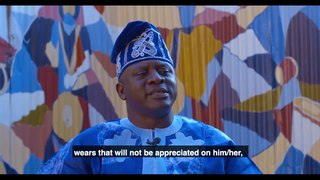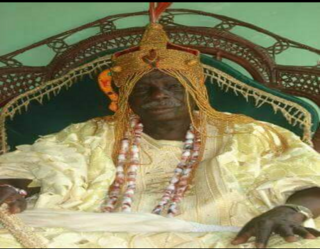
Ifẹ̀ is an ancient Yoruba city in south-western Nigeria, recent in-depth archeologically estimates suggest Ife's founding to be between the 10th century BC and 6th century BC and is widely agreed upon by historians to be the oldest amongst the classical and post-classical Yoruba city-states. The city is located in present-day Osun State. Ifẹ̀ is about 218 kilometers northeast of Lagos with a population of over 500,000 people, which is the highest in Osun State according to population census of 2006.

Osogbo is a city in Nigeria. It became the capital city of Osun State in 1991. Osogbo city seats the Headquarters of both Osogbo Local Government Area and Olorunda Local Government Area. It is some 88 kilometers by road northeast of Ibadan. It is also 108 kilometres (67 mi) by road south of Ilorin and 108 kilometres (67 mi) northwest of Akure. Osogbo shares boundaries with Ikirun, Ilesa, Ede, Egbedore, Ogbomosho and Iragbiji and it is easily accessible from any part of the state because of its central nature. It is about 48 km from Ife, 32 km from Ilesa, 46 km from Iwo, 48 km from Ikire and 46 km from Ila-Orangun; the city had a population of about 200,000 people and an approximate land area of 126 km. The postal code of the area is 230.

Ẹdẹ is a town in Osun State, southwestern Nigeria. It lies along the Osun River at a point on the railroad from Lagos, 180 kilometres (110 mi) southwest, and at the intersection of roads from Oshogbo, Ogbomosho, and Ile-Ife. The two (2) local government areas in Ẹdẹ are Ẹdẹ South and Ẹdẹ North. There are three (3) major tertiary institutions in Ẹdẹ, which makes the town one of the fastest growing towns in the south-west with an increasing literacy rate. The Federal Polytechnic Ẹdẹ, Adeleke University, and Redeemer's University are among the institutions.

Osun State, occasionally known as the State of Osun by the state government, is a state in southwestern Nigeria; bounded to the east by Ekiti and Ondo states for 84 km and for 78 km respectively, to the north by Kwara State for 73 km, to the south by Ogun State for 84 km and to the west by Oyo State, mostly across the River Osun. Named for the River Osun—a vital river which flows through the state—the state was formed from the southeast of Oyo State on 27 August 1991 and has its capital as the city of Osogbo.
Ilobu is a town and the administrative headquarters of Irepodun Local Government Area of Osun State, Nigeria. It is located in a sparsely forested area and is bounded on the north by Ifon-Osun, on the south by Osogbo, on the east by Oba and on the west by Erin-Osun. It is watered by Ojutu River, Erinle River, Konda River and a few other streams. The town is said to have been founded by Laarosin, a powerful warrior in the Old Oyo Empire. It has a population of about 30,825.
The Ìgbómìnà are a subgroup of the Yoruba ethnic group, which originates from the north central and southwest Nigeria. They speak a dialect called Ìgbómìnà or Igbonna, classified among the Central Yoruba of the three major Yoruba dialectical areas. The Ìgbómìnà spread across what is now southern Kwara State and northern Osun State. Peripheral areas of the dialectical region have some similarities to the adjoining Ekiti, Ijesha and Oyo dialects.
Òkè-Ìlá Òràngún is an ancient city in southwestern Nigeria that was capital of the middle-age Igbomina-Yoruba city-state of the same name.
Inisa is a city in Osun State in the south-western Nigeria. It is in the Yoruba cultural and ethnic region of the country, and is a trading center for cocoa and other agricultural products grown in the surrounding area. Its population as of 2007 was 180,553. Inisa had been from time immemorial, a warrior community. She was deeply involved in the struggle for the survival of Yoruba race during the period of internecine wars and particularly, during the onslaught and incursions of the Fulani into Yorubaland in the 19th century. Inisa people participated actively in the series of the wars. They fought in the Osogbo war of 1840, the Jalumi War of 1878, the Ofa war (1886–1890) and the Daparu war. The Ofa war resulted from the desire of Ilorin-fulani to avenge their defeat at the Jalumi on Ofa and the neighboring towns. The war was fought during the reign of Oba Oloyede Ojo, Otepola 1. They laid siege on Ofa for several years before Ofa was eventually sacked around 1890. The Daparu war resulted from the sack and fall of Ofa. The Fulani now desired to sack all the towns and villages between Ofa and Osogbo and bring them under the rule of the Fulani of Ilorin. They continued to attack, raid, and wage wars against the people. Only Inisa was courageous enough to face the Fulani forces, as the other towns and villages were deserted, seeking refuge at the Ibadan war camp in Ikirun.
Offa is a city in Kwara State of Nigeria, with a population of about 166,112 inhabitants. The town is noted for its weaving and dyeing trade, using vegetable dyes made from locally grown indigo and other plants. Offa is well known for the cultivation of sweet potatoes and maize which also formed part of the favourite staple foods for the indigenes in the town. Cattle, goats and sheep are also raised there. The main religions practiced in the town are Islam, Christianity and traditional religions.
Oba means "ruler" in the Yoruba and Bini languages. Kings in Yorubaland, a region which is in the modern republics of Benin, Nigeria and Togo, make use of it as a pre-nominal honorific. Examples of Yoruba bearers include Oba Ogunwusi of Ile-Ife, Oba Aladelusi of Akure, and Oba Akiolu of Lagos. An example of a Bini bearer is Oba Ewuare II of Benin.
Ijebu-jesa is the capital of Oriade Local Government area in Osun State of Nigeria.
Ejigbo is a prominent city in Yoruba Land and the headquarters of Ejigbo Local Government Area, one of the oldest local government areas of Osun State in Nigeria. Ejigbo is strategically placed in the middle of the region, as 35 kilometres (22 mi) north-east of Iwo, 30 km (19 mi) from Ogbomoso in the north and 24 km (15 mi) from Ede in the south-east. It is about 40 km (25 mi) north-west of Osogbo, the capital of Osun State, and about 95 km (59 mi) north-east of Ibadan. It is part of the Ede North/Ede South/Egbedore/Ejigbo federal constituency. The population is 138,357 according to the GeoNames geographical database. The average elevation is 426 metres (1,398 ft).
Esa-Oke is a Yoruba town located at the Obokun Local Government Area of the Ijesa North Federal Constituency of Ife/Ijesa Senatorial District of Osun State, South-West of Nigeria. It is a native Ijesa (Ijesha) community and shares boundaries with other towns namely: Oke-Imesi, Imesi-ile, Ijebu-Ijesa, Esa-Odo, Efon-Alaaye. Omiran Adebolu, a member of the Olofin family of Ile-Ife, though disputably, was believed to have founded Esa-Oke after he left Ile-Ife in 1184 A.D.
Alayeluwa Oba Okunade Sijuwade CFR was the fiftieth traditional ruler or Ooni of Ife from 1980 to his death in 2015, taking the regnal name Olubuse II. He was the traditional ruler of the Yoruba Kingdom of Ile-Ife a traditional Yoruba state based in the town of Ife in Osun State, Nigeria. He was crowned on 6 December 1980 in a ceremony attended by the Emir of Kano, Oba of Benin, Amayanabo of Opobo and Olu of Warri, as well as by representatives of the Queen of England.
Ipetumodu () is a city in Osun State, in the southwestern part of Nigeria. It is the headquarters of the Ife North local government. The city is under the leadership of traditional ruler with the title of Apetumodu, which means "one who killed an antelope for sacrificial purposes for Odu".
Eko-Ende is a community in the Ifelodun Local Government Area of Ọṣun State, Nigeria.
Ojude Obafestival is an ancient festival celebrated by the Yoruba people of Ijebu-Ode, a town in Ogun State, Southwestern Nigeria. This annual festival usually takes place the third day after Eid al-Kabir (Ileya), to pay homage and show respect to the Royal Majesty, the Awujale of Ijebuland. It is one of the most spiritual and glamorous festivals celebrated in Ijebuland and generally in Ogun State as a whole.

Oba Francis Adedoyin was the Ogunsua or traditional ruler of Modakeke, he comes from Olaogbin Royal family in Modakeke. He was one of the wealthiest rulers and a popular Oba in the Yorubaland.
Alara is the royal title of the king of Ilara-Mokin land in Nigeria. The Alara may be addressed as Oba, like rulers in other Yoruba kingdoms, or as His Royal Majesty. Alara is also known to be unquestionable, with an authority that is said to be next to the gods.
Ademola Nurudeen Jackson Adeleke ; born 13 May 1960) is a Nigerian politician and businessman, who has served as governor of Osun State since 2022. He was the senator that represented the Osun-west senatorial district from 2017 to 2019.





